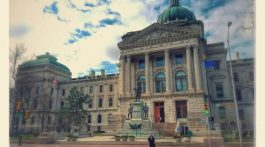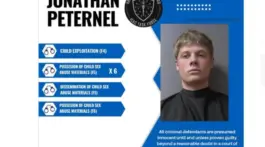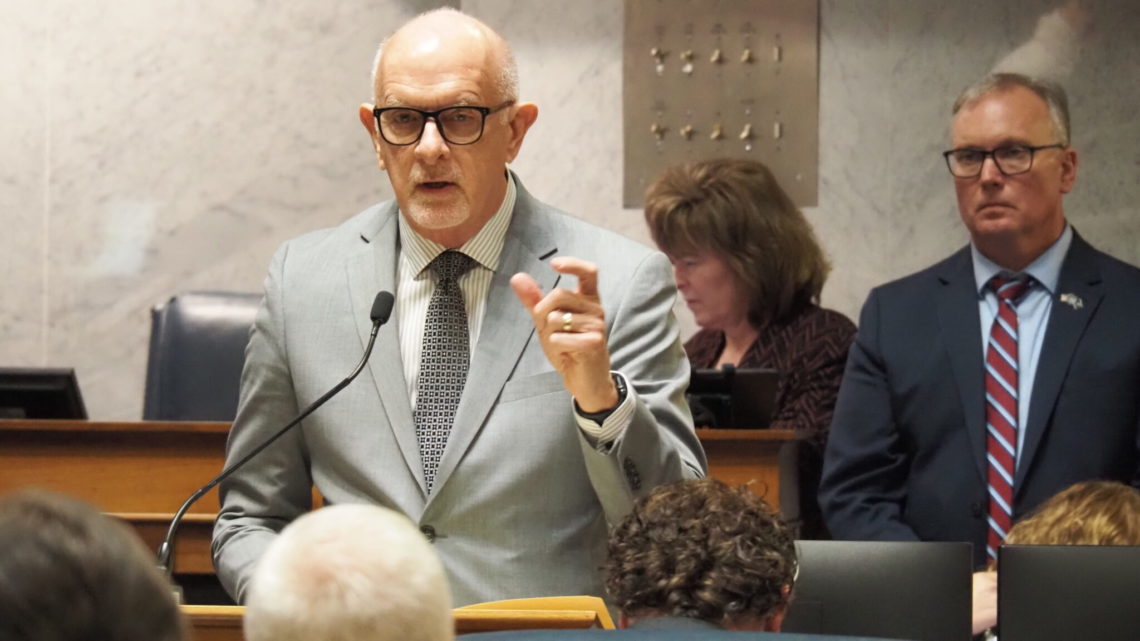by Casey Smith and Leslie Bonilla Muñiz, Indiana Capital Chronicle
April 15, 2025
Shortly after midnight Tuesday, Indiana Senate Republicans agreed to significant changes in an immense local property and income tax plan — avoiding risky negotiations in favor of sending it to Gov. Mike Braun.
Despite earlier reservations — and a pressure campaign to veto — the governor appeared resolute immediately following the Senate vote.
“This is historic property tax relief. Senate Bill 1 cuts property taxes for most Hoosier homeowners, farmers, and businesses, limits future tax hikes, and makes the tax system fairer, more transparent, and easier to understand,” Braun said in a statement. “Real property tax relief was a core promise of my Freedom and Opportunity Agenda and with the collaborative leadership of our legislators, we are delivering real savings and protections for taxpayers. I look forward to signing the bill as soon as I receive it.”
The 27-22 tally came well ahead of an end-of-month deadline and followed a marathon day in the Senate chamber. Twelve Republicans joined Democrats in opposition: Sens. Ron Alting, Eric Bassler, Vaneta Becker, Mike Bohacek, Jim Buck, Cyndi Carrasco, Spencer Deery, Dan Dernulc, Aaron Freeman, Jim Tomes, Mike Young and Andy Zay
None of those senators spoke on the bill.
Senate Bill 1 would save homeowners a collective $1.2 billion in property taxes over three calendar years, from 2026 through 2028, according to a Thursday fiscal analysis. It does so largely by creating a credit for 10% off every homestead’s bill, up to $300 each.
That’s after House lawmakers on Wednesday made sweeping edits featuring the governor’s blessing and Senate input. It’s a far cry from Braun’s original plan.
Democrats discussed lost revenue for schools and communities that will force either local income tax hikes or severe service cuts.
Local units of government would lose a projected $1.5 billion over the three years, per the fiscal analysis. Public school corporations alone represent about half the anticipated loss, at $744 million — although Democrats contend other tax changes push that figure to almost $800 million.
“We’ve heard relief, relief, relief,” said Sen. Andrea Hunley, Indianapolis. “But the efforts that we have in Senate Bill 1 are complex, and I don’t feel like they go far enough, and I do think that they create winners and losers.”
But Republicans noted revenue still goes up for most units — just not as much as under current law.
For instance, the city of Fort Wayne would see its property tax revenue rise from $167 million in 2025 to $201 million in 2028 if no changes are made. Under Senate Bill 1, the city will see revenue rise from $167 million to $187 million in 2028.
” I want to make sure we know it’s not loss, it’s unrealized potential gain,” said Sen. Scott Baldwin, R-Noblesville.
Still, Democrats weren’t the only ones unhappy with the deal.
“NOBODY understands this thing … including me!” Lt. Gov. Micah Beckwith, Braun’s second-in-command, posted Saturday. “On that basis alone we can’t let this become law. The Gov needs to VETO this thing, call a special session and demand the legislature pass something that the average Hoosier can understand without hiring army of lawyers and accountants!!”
Debate focuses on local income taxes
Senators started debate on the bill at 10:35 p.m. A vote followed nearly two hours later at 12:18 a.m. Tuesday.
During the discourse, bill author Sen. Travis Holdman, R-Markle, emphasized that Indiana’s property taxes “are very complicated” — and that “it’s taken the legislature 50 years to make it as complicated as we possibly could” — but under this bill, two-thirds of homeowners will receive a lower bill in 2026 compared to 2025.
The legislation caps total local income tax rates for all counties to 2.9%, down from 3.75%. Municipalities would be authorized to impose rates up to 1.2% within that county total — a tool they have not had before. Under current law, they have to get county officials on board to nab a local income tax.
Indianapolis Democrat Sen. Greg Taylor said Hoosier taxpayers were promised relief on property tax bills, “but I guess we didn’t add the comma and say, ‘But you really end up paying more on your income tax.’” He worried that locals will be forced to cut essential services if they resist income tax hikes.
Indiana House Republicans OK massive local property, income tax plan that Democrats dub a ‘scam’
“When your city council comes to you and says, ‘What do you want us to do? Cut services or increase (local income taxes)?’… we’re going to say, ‘Well, we gave you an option,’” Taylor said.
“We know what the option is going to be. We’re going to cut services. You mark my words. You’re going to cut services,” he continued. “You think we’ve got road problems? You think we’ve got access to government service problems? Just wait.”
Holdman held that while higher local income taxes “may be the case in some situations,” raising those taxes remains optional.
Instead, he preferred for local governments to become “more efficient” before raising taxes.
“I think there are expenses that cities and towns and county governments have that they could trim their budgets,” Holdman added. “I think there needs to be a review of all expenditures at a local level to make sure that they’re spending their dollars wisely.”
Also under the bill, fixed-income seniors would get an additional $150 discount off their property tax bills stacked atop the $300 maximum available to the general population. Disabled veterans could also qualify for stackable credits of $150 and $250.
In exchange, lawmakers nixed assessed-value-based deductions for those populations.
Renters ‘left out’
Over three years, the bill would cut property taxes by about $25 million for apartments, almost $69 million for other residential properties, $116 million on farmland and $145 million on personal property. But bills for agricultural business and other real properties would rise by $63 million and $720 million, respectively.
That adds up to about $802 million in savings across other property types.
The overhauled legislation additionally phases in a major increase in the acquisition cost threshold for the business personal property tax exemption — from $80,000 to $2 million — and narrows application of the 30% depreciation floor. It previously would’ve phased the tax itself out by 2030 on anything purchased this year or later.
Still, Sen. Fady Qaddoura, D-Indianapolis, questioned why the bill does not directly address — or provide relief for — the 560,000 tenants across the state.
Holdman held that his measure deals with property taxes, which “tenants do not pay.”
Need to get in touch?
Have a news tip?
Qaddoura disagreed.
“Tenants do pay property tax,” he said. “When you live in an apartment building or in a house, the landlord will pass all of these costs, including property taxes.”
Hunley further took issue with the inclusion of Senate Bill 518, a measure to require traditional schools to share property taxes with charters. Another provision dissolve the Union School Corporation.
“I think that we do need to talk about process and procedure, and the fact that this is the way that we’re going to do business from now on — that we can just simply amend into a piece of legislation the closure of an entire school district,” she said. “And that we can do that without regard for public hearing or process, and that we can just redraw new maps and new boundary lines for an entire school corporation, for families, for a whole community from up here on high in Marion County, and determine what’s best without true regard for collaboration with the community.”
Before the vote, Sen. Rodney Pol, D-Chesterton, reiterated that the legislation “is too big,” and that lawmakers “have forced too much into one bill.”
“As you shuffle the burden of taxes, there may be some that gets pushed to businesses. … but ultimately, we’re doing so at the expense of already struggling schools, struggling communities, renters and others that need us most,” he said. “There are multiple poison pills throughout this thing. And ultimately, school districts and local communities will have to make the toughest decisions that they’ve ever had to, at a time where things are just uncertain.”
GET THE MORNING HEADLINES.
Indiana Capital Chronicle is part of States Newsroom, a nonprofit news network supported by grants and a coalition of donors as a 501c(3) public charity. Indiana Capital Chronicle maintains editorial independence. Contact Editor Niki Kelly for questions: info@indianacapitalchronicle.com.











